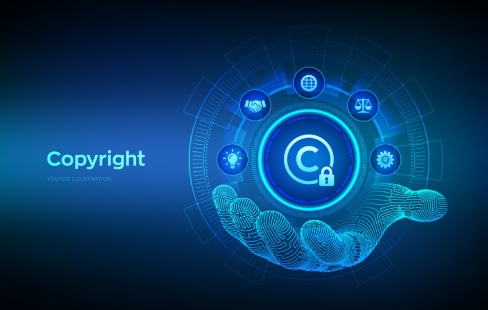-
The digital age and the Internet offer both significant opportunities and substantial challenges for creators. This world has provided a fantastic platform for artists to share their work with a global audience. It breaks down geographical barriers and makes creative expression more accessible to all. Musicians can now upload their music to streaming services, photographers can display their portfolios on social media, and writers can self-publish ebooks. It helps reach a larger audience than ever before. However, this ease of sharing has also opened a Pandora's box of copyright infringements. However, leveraging blockchain solutions can disrupt the traditional copyright protection model and empower creators like never before.
The Concept of Copyright
Copyright is the Intellectual Property Right that safeguards original works of authorship, such as literary works, music, dramatic works, choreographic works, sculptural, pictorial and graphic works, sound recordings, artistic works, architectural works, and computer software. Creators often struggle to protect their intellectual property from illegal downloads and unauthorized use by others, which can lead to revenue loss. The internet's nature, built on ease of duplication and distribution, makes it challenging to enforce copyright.
Thus, copyright infringement happens when someone uses a protected work without permission from the owner.
You may also like | Intellectual Property Rights Management with Blockchain
Challenges Faced by Creators
Unauthorized Use and Piracy
Unauthorized copying and distribution of digital content, such as music, art, literature, or software, deprive creators of revenue and diminish their work's value.
Proving Ownership
Proving digital content ownership is complicated, often requiring extensive documentation that may not always be available in disputes.
Revenue Distribution
Traditional revenue distribution methods in creative industries are slow and opaque, often resulting in creators not receiving their fair share of royalties due to intermediaries and system inefficiencies.
Lack of Transparency
The current copyright system lacks transparency, making it difficult for creators to track the use of their works.
Also, Read | How Blockchain Solves the Intellectual Property Problem of AI
How does Blockchain help Solve Copyright Challenges?
Blockchain technology offers innovative solutions to the significant copyright challenges faced by creators.
Combatting Unauthorized Use and Piracy
Blockchain can provide a secure and transparent way to track the distribution and usage of digital content. By registering works on a blockchain, creators can establish a clear record of ownership and licensing terms. This makes it easier to detect and prevent unauthorized use. Additionally, blockchain-based DRM (Digital Rights Management) systems can restrict access to content, ensuring that only authorized users can view or distribute it.
Proving Ownership
Blockchain provides an immutable ledger where creators can register their works with a timestamp, proving originality and ownership beyond doubt. Each transaction or registration on the blockchain is permanently recorded and cannot be altered, providing a clear, verifiable record of who created a piece of content and when.
Streamlining Revenue Distribution
Smart contracts on the blockchain can automate licensing and revenue distribution. When a piece of content is used, the smart contract automatically ensures that the creator is compensated according to predefined terms. This reduces the need for intermediaries, speeds up payment processes, and ensures creators receive their fair share of royalties.
Enhancing Transparency
Blockchain's transparent nature allows all parties involved to see how and where a piece of content is being used. This transparency makes it easier for creators to track the usage of their work and ensure they are being compensated properly. Every transaction related to a piece of content is recorded on the blockchain, providing a clear and accessible history of its use.
Also, Discover | How Blockchain Helps to Transform the Trade Finance Sector
Real-World Applications and Examples
Music and Entertainment
Platforms like Audius and Mycelia use blockchain to give musicians more control over their music and fairer revenue distribution.
Art and Digital Media
Platforms such as Artory and Verisart enable artists to register their works, ensuring authenticity and making it easier to track provenance and ownership.
Publishing
Companies like Poet and Publica use blockchain to help authors and publishers protect their works, manage rights, and streamline royalty payments.
Discover more | Blockchain-Based Streaming for Fairer Content Monetization
Conclusion
The digital age presents creators with both immense opportunities and significant challenges. Blockchain technology offers a promising solution to these issues by providing a secure, transparent, and immutable ledger. It can help creators establish clear ownership, combat unauthorized use, streamline revenue distribution, and enhance transparency in the use of their works.
As blockchain technology continues to evolve, it can potentially empower creators. It also ensures they receive fair recognition and compensation for their work. If you're a creator looking to safeguard your intellectual property or a business interested in integrating blockchain solutions, now is the time to act. Contact the expert blockchain developers at Oodles Blockchain to explore customized solutions tailored to your needs.

Our Offices
INDIA
Emaar Digital Greens, Sector 61,
Gurugram, Haryana
122011.
Welldone Tech Park,
Sector 48, Sohna road,
Gurugram, Haryana
122018.















